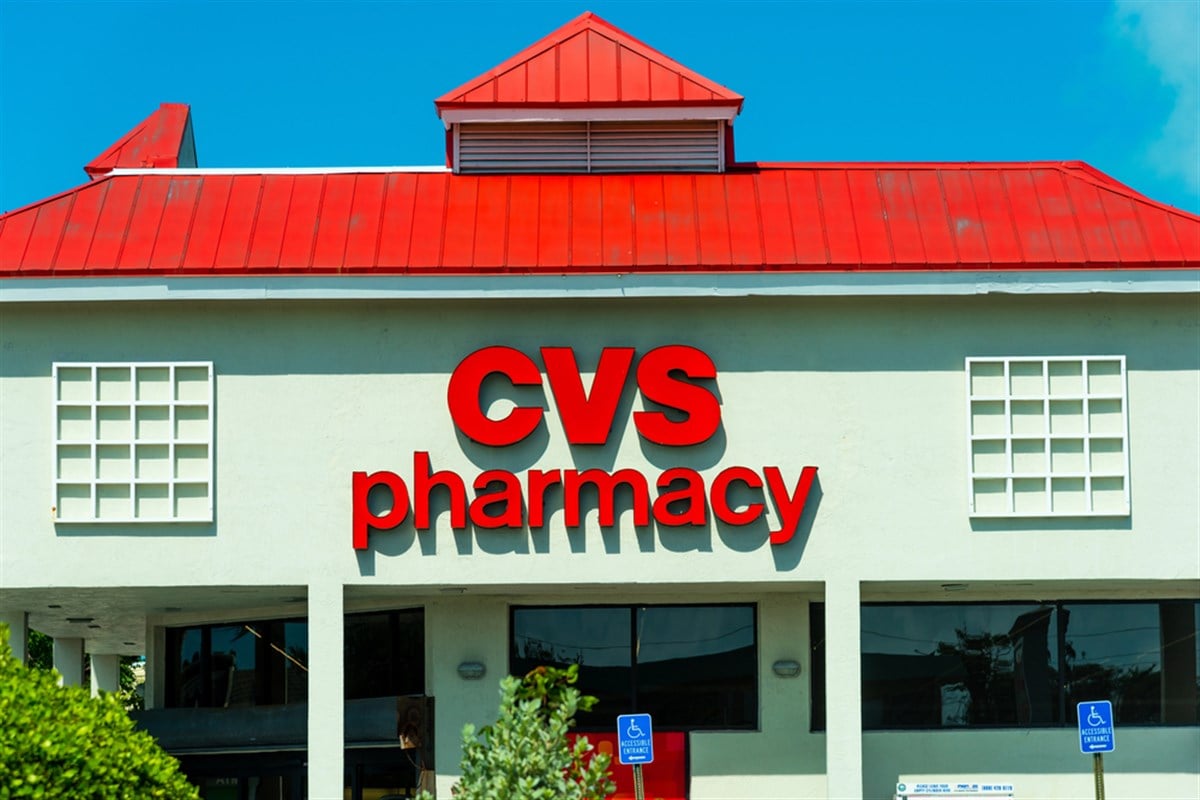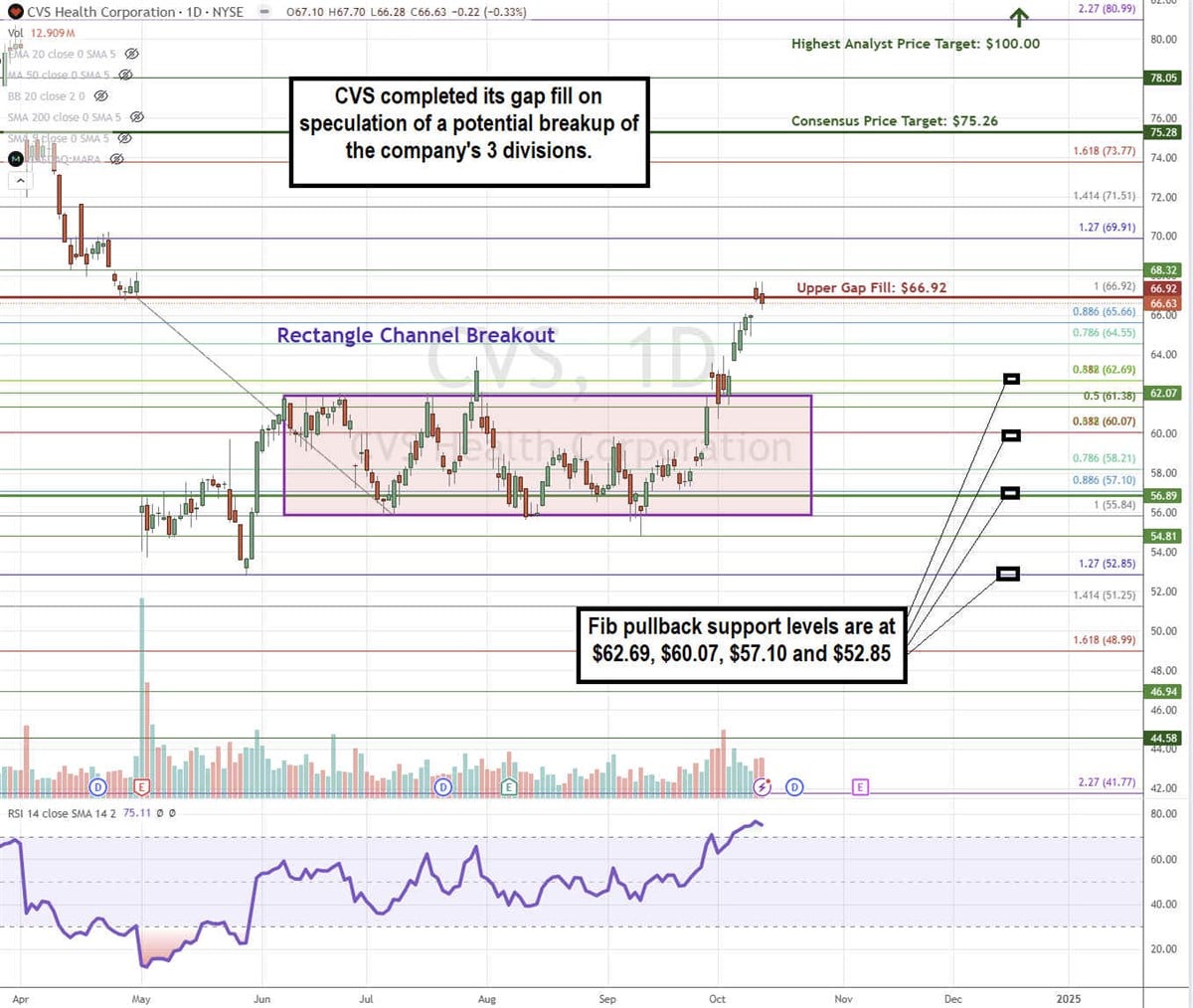
CVS Health Co. (NYSE: CVS)transformed from one of the largest drug store pharmacy chains in the country to an integrated healthcare company when it acquired Aetna Health Insurance for $70 billion on November 28, 2018. The plan was to offer the full gamut of healthcare services and products and grow its Minute Clinics around the country, cashing in on primary care services. The medical sector company also ceased selling tobacco products at its drug stores since they weren’t healthy.
The Transformation Faces Mounting Pressures
Fast-forward six years, and the transformation is now leaving investors and analysts with doubt as its health insurance business is taking hits from its Medicare Advantage business. Its drug store pharmacy business faces pressure from competitors like Walgreens Boots Alliance Inc. (NASDAQ: WBA) and Walmart Inc. (NYSE: WMT). CVS Health has been attempting a turnaround and may even consider splitting up the company again. The company is comprised of three divisions: Health Care Benefits, Health Services, and Pharmacy and Consumer Wellness.
Rising Medical Costs Tanked Adjusted Operating Income by 39.1% YoY
In its second quarter of 2024, CVS Health posted decent headline numbers, reporting $1.83 earnings per share, which bested analyst estimates by 10 cents. Revenues even posted a 2.6% YoY gain to $91.23 billion, below the $91.41 billion consensus estimates. However, under the hood, some troubling trends were revealed. The EPS of $1.83 reflected a 17% YoY drop in profits. Its Health Care Benefits division, Aetna health insurance, suffered a 340 bps YoY jump in its medical benefit ratio (MBR). In a nutshell, the lower the MBR, the better for the insurer. This caused adjusted operating income to collapse by 39.1% YoY. CVS attributes this to its Medicare Advantage (MA) star ratings for 2024.
The Bright Spots Were Overshadowed
Its Pharmacy and Consumer Wellness segment is its retail drug store business, which saw revenues rise 3.7% YoY, driven by increased drug prices and volume. It also grew its pharmacy market share. Its Health Services segment, which is its Minute Clinics, primary care services, and pharmacy benefits management (PBM) segment, saw a revenue decline of 9% YoY. Its Signify Health in-home health assessments and Oak Street Health primary care centers had record volumes and a 30% boost in at-risk patients, but that was overshadowed by the loss of a large client it previously warned of.
CVS Lowered Its Full Year 2024 EPS
The MBR tends to rise in the second half as patients tend to schedule more procedures and appointments, driving up costs. CVS lowered its full-year 2024 EPS forecast again to $6.40 to $6.45, down from $7.00, which was lowered from the $8.50 original forecast, signaling an alarming trend. The MBR forecast was raised from 90.6% to 90.8%, up from 89.8%. Remember, rising MBR is bad, and falling MBR is good. It was during the third quarter of 2023 when major health insurers were blindsided by surging inpatient utilization and medical costs, notably among its MA patients.
Activist Glenview Capital Meets With Management
On September 30, 2024, The Wall Street Journal reported that activist investor Glenview Capital plans to meet with management and may be pushing the company for a breakup. Glenview denied it was pushing for a breakup and emphasized its conversations were private and should remain so. CVS Health stated that it was undergoing a $2 billion cost-cutting plan, which would include layoffs of up to 2,900 front-line jobs. The company is also exiting its core infusion services.
Analysts Chime In
On October 4, 2024, TD Cowen upgraded CVS to a Buy from Hold, raising its price target to $85 from $59. Analyst Charles Rhyee stated that an 8.6x multiple combined with a 4% annual dividend yield makes for an attractive risk-reward scenario, with the strategic review being an added catalyst. RBC Capital Markets believes there is value in separating its retail business and maintains its Outperform rating with a $68 price target. Barclays believes the retail pharmacy segment should be an owned asset, but the insurance and PBM combination might struggle to find a fair valuation.
CVS Stock Completes the Gap Fill
A gap is filled when the stock rises back up to the price level that started the gap down.

CVS formed the gap down from $66.92 on April 30, 2024, to $56.89 on May 1, 2024, on the earnings dumper. The stock has since been chopping sideways in a rectangle range until Glenview Capital met with management, and speculation swirled about the potential breakup. Shares finally completed the upper gap fill, rising to $66.63 on October 10, 2024. The daily RSI rose to the 75-band. Fibonacci (Fib) pullback support levels are at $62.69, $60.07, $57.10, and $52.85.
CVS Health’s average consensus price target is $75.26, and its highest analyst price target sits at $100.00. Analysts have given it 13 Buy ratings and eight Hold ratings. The stock trades at 10.24x forward earnings.